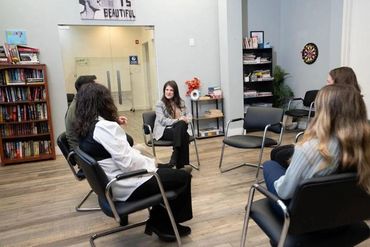
Cognitive Behavioral Therapy (CBT) for Addiction in Connecticut
Find Cognitive Behavioral Therapy (CBT) treatment for addiction in Connecticut. CBT helps treat addiction by identifying triggers, changing harmful thought patterns, building coping skills, and preventing relapse through improved self-awareness and decision-making. Find CBT treatment centers in Connecticut today!
Treatment Centers in Connecticut
All Treatment Centers in Connecticut
Are You Covered For Treatment?
- Waterbury Rehabs
- Bridgeport Rehabs
- New Haven Rehabs
- Hartford Rehabs
- Danbury Rehabs
- Middletown Rehabs
- New London Rehabs
- Torrington Rehabs
- West Haven Rehabs
- New Britain Rehabs
Rehab Insurance Coverage in Connecticut
Rehab Centers in Connecticut
Information About Rehab in Connecticut
Latest Reviews
Latest Reviews of Rehabs in Connecticut
Turnbridge
I was a client at turnbridge from January 2017-January 2018. I came in with over a year of sobriety voluntarily. I am now discharged and living independently in Florida. I am sober two and a half years. Inpatient rehab taught me how to get sober, Turnbridge taught me how to live sober. I was lucky to be placed in the care of world class staff. They were professional, treated me with kindness and respect, wanted to see me succeed, listened to my needs, and helped me through the normal anxieties that come with re-integrating into life after getting sober. I am still in contact with many of the staff and administration at Turnbridge. They don't just discharge you and not keep in touch. They genuinely want to see how I am doing and wish for my continued success and sobriety. I found that most of the staff I regularly interacted with were doing what they did because they personally in some way were either affected by this disease or knew who someone who was and genuinely wanted to make a difference in the lives of the women they worked with. I have very fond memories of this place.
MCCA Trinity Glen Kent Long-Term Residential Treatment for Women
I was at T.G from March to July of 2013....I didn't mind the work part of "work" program.....I was In the kitchen 5 or 6 days a week for 6-8 hours a shift.....didn't mind at all, AND besides, it was very nice to say that while I was the lead cook there, our food was BETTER than at KENT FALLS.....
REACH Adult and Youth Services
Great program for improving your mental and physical health.
About Connecticut
Connecticut is located in the northeastern region of the United States. With a population of approximately 3.6 million 1, it is the third smallest state in the US by area but one of the most densely populated. Its geography consists of rolling hills, valleys, and forests, with the Connecticut River running through the center of the state.
Connecticut is known for its rich history, diverse culture, and picturesque landscapes. It is home to several prestigious universities, including Yale University and the University of Connecticut, as well as a thriving arts and entertainment scene. The state has a reputation for being a hub of innovation and entrepreneurship, with many successful businesses and industries based in the state. Connecticut is also known for its excellent healthcare system and high standard of living, making it a desirable place to live and work.
Addiction in Connecticut
Connecticut, like many states in the country, is grappling with increasing rates of substance misuse and addiction among its residents. According to Connecticut’s Department of Public Health, Connecticut residents face a higher risk of dying from unintentional drug overdose compared to motor vehicle accidents. Prescription opioid painkillers and illicit opioids are the main culprits behind most of these deaths.2
In recent years, the state has seen a significant rise in opioid-related deaths and hospitalizations. According to the Centers for Disease Control and Prevention, Connecticut had 1,552 drug overdose deaths, a rate of 42.3 deaths per 100,000 persons in 2021.3
Alcohol misuse and Alcohol Use Disorder are also issues of increasing concern in the state. From 2017 to 2019, approximately 6.3% of the population in Connecticut, which is equivalent to around 194,000 individuals, had reported having alcohol use disorder within the past year. This rate is higher than the national average of 5.3%.4
Addiction Treatment in Connecticut
If you are seeking recovery from substance misuse and addiction, Connecticut is home to a range of addiction treatment options, each with their own benefits and levels of care. They include:
- Detox: Detoxification, or “detox,” is often the first step in addiction treatment. This process involves medically supervised withdrawal from drugs or alcohol, with the goal of safely managing withdrawal symptoms and preparing the individual for ongoing treatment. Detoxification can be done on an outpatient or inpatient basis, depending on the severity of the addiction and the level of care required.
- Inpatient Treatment: Inpatient treatment, also known as residential treatment, involves a stay at a treatment center where individuals receive 24-hour care and support. This type of treatment is often recommended for individuals with severe addiction or co-occurring mental health disorders, as it provides a structured environment and intensive therapy.
- Outpatient Treatment: Outpatient treatment is a less intensive option that allows individuals to receive treatment while continuing to live at home. Outpatient treatment can vary in intensity, from weekly therapy sessions to more intensive programs that require several hours of treatment each day.
Connecticut also offers specialized treatment programs for specific populations, such as women, veterans, and LGBTQ+ individuals. These programs often incorporate therapies that address the unique needs and challenges faced by these groups.
Additionally, there are options for luxury rehabs, which offer high-end accommodations and amenities in addition to treatment services. Private-funded rehabs may also be an option for those who can afford to pay for treatment out-of-pocket or through private insurance.
To find addiction treatment in Connecticut, you can use our search tool, which provides local drug and alcohol rehab options near you.
How Much Does Rehab Cost?
Addiction treatment is a medical necessity for those struggling with substance abuse disorders. Fortunately, most health insurance plans in the United States are required to offer coverage for addiction treatment. However, the extent of coverage may vary depending on the specific insurance plan, so it’s important to review your plan details or check with your insurance provider to understand the level of coverage available to you.
If you are uninsured, or your insurance plan doesn’t cover addiction treatment, there are still options available to you. Connecticut has numerous state-funded addiction treatment centers for those who do not have insurance and cannot afford to pay for treatment. These centers may provide free or low-cost addiction treatment services to individuals who meet certain income or eligibility criteria. The services available at these centers may include detoxification, counseling, therapy, and medication-assisted treatment.
In-Network Insurance Options
Length of Stay in Rehab
When it comes to addiction treatment, there are several options for the duration of your rehab stay. The most common options include 30-day, 60-day, and 90-day programs, each offering a different level of care and support.
Long-term rehab is another option if you struggle with a complex addiction or co-occurring mental health issues. Long-term rehab programs typically last between 6 months and 2 years, depending on your specific needs, the facility you choose, and the program you are enrolled in.
Recovery Starts Today
The key to a successful recovery from addiction lies in finding treatment that caters to your specific needs. It is important to remember that addiction is a manageable condition, and with the right support, you can enjoy a rewarding, healthy life. Take the first step towards a brighter future today.
Sources:
- United States Census Bureau. July 1,2022. QuickFacts-Connecticut.
- Connecticut Department of Public Health. 2023. Opioid and Drug Overdose Statistics.
- Centers for Disease Control and Prevention. 2021. Drug Overdose Mortality by State.
- Substance Abuse and Mental Health Services Administration. 2020. Behavioral Health Barometer: Connecticut, Volume 6
